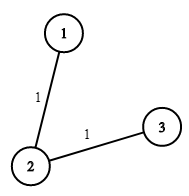Optimize Water Distribution in a Village
There are n houses in a village. We want to supply water for all the houses by building wells and laying pipes.
For each house i, we can either build a well inside it directly with cost wells[i], or pipe in water from another well to it. The costs to lay pipes between houses are given by the array pipes, where each pipes[i] = [house1, house2, cost] represents the cost to connect house1 and house2 together using a pipe. Connections are bidirectional.
Find the minimum total cost to supply water to all houses.
Example 1:

Input: n = 3, wells = [1,2,2], pipes = [[1,2,1],[2,3,1]] Output: 3 Explanation: The image shows the costs of connecting houses using pipes. The best strategy is to build a well in the first house with cost 1 and connect the other houses to it with cost 2 so the total cost is 3.
Constraints:
- 1 <= n <= 10000
- wells.length == n
- 0 <= wells[i] <= 10^5
- 1 <= pipes.length <= 10000
- 1 <= pipes[i][0], pipes[i][1] <= n
- 0 <= pipes[i][2] <= 10^5
- pipes[i][0] != pipes[i][1]
Solution:
class Solution {
static class UF {
int[] parent;
int[] size;
int count;
public UF(int n) {
parent = new int[n + 1];
size = new int[n + 1];
for (int i = 0; i <= n; i ++) {
parent[i] = i;
size[i] = 1;
}
count = n + 1;
}
public int find(int x) {
while (parent[x] != x) {
parent[x] = parent[parent[x]];
x = parent[x];
}
return x;
}
public boolean union(int x, int y) {
int rx = find(x);
int ry = find(y);
if (rx == ry) return false;
if (size[rx] > size[ry]) {
parent[ry] = rx;
size[rx] += size[ry];
} else {
parent[ry] = rx;
size[ry] += size[rx];
}
count --;
return true;
}
}
public int minCostToSupplyWater(int n, int[] wells, int[][] pipes) {
PriorityQueue<int[]> pq = new PriorityQueue<int[]>((a, b) -> a[2] - b[2]);
for (int i = 0; i < wells.length; i ++) {
pq.offer(new int[]{i + 1, i + 1, wells[i]});
}
for (int[] pipe : pipes) {
pq.offer(pipe);
}
UF houses = new UF(n);
int cost = 0;
while (houses.count > 1) {
int[] next = pq.poll();
if (next[0] == next[1] && houses.union(0, next[0])) {
cost += next[2];
} else if (houses.union(next[0], next[1])) {
cost += next[2];
}
}
return cost;
}
}